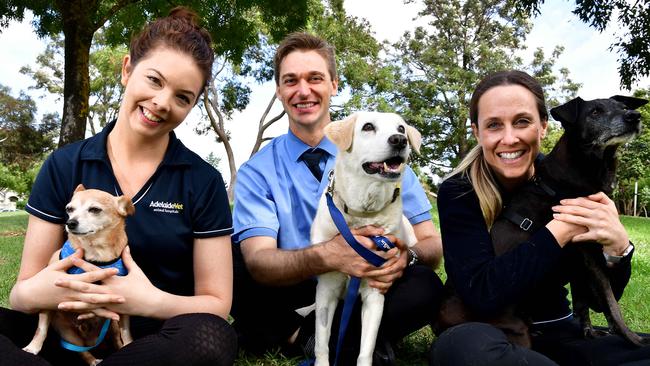Bad trainer! Why vets and the RSPCA say cruel pet control methods should be banned
Vets and animal welfare organisations are calling for unqualified pet trainers – and their cruel methods including choke chains and prong collars – to be banned in SA.
Pets and Wildlife
Don't miss out on the headlines from Pets and Wildlife. Followed categories will be added to My News.
Pet trainers would be regulated to ban the use of physical force, cruel collars and fear-based methods to control behaviour in a push from vets, animal welfare organisations and qualified trainers.
The move will be considered in a review of dog and cat legislation next year.
Choke chains and prong collars could also be outlawed in South Australia, just as shock collars have been.
It comes after a Covid-induced boom in pet ownership including a cohort of “pandemic puppies” that missed normal opportunities to be socialised and are considered more likely to have behaviour problems as a result.

The number of dogs registered in SA grew by 7027 last financial year to reach 302,475.
Cat registrations ballooned a whopping 37 per cent to 70,354, though authorities believe cats are just popular as dogs, meaning many still remain unregistered.
A Dog and Cat Management Board spokesman said “commitment to positive-reinforcement training” was part of responsible dog owner ship and the board did not condone training methods that “cause a dog to feel pain, fear, aggression or anxiety”.
However, trainers using these methods still operate because the industry is completely unregulated.
AdelaideVet behavioural veterinarian Dr Eleanor Parker said “several people and institutions operating in Adelaide” were actively harming dogs using abusive training methods, because “they don’t understand dog psychology”.
“Abusive training methods are proven to make dogs potentially more anxious and aggressive and more likely to bite and hurt their owner,” she said.
“So not only are their methods abusive and unethical, but they are also unsafe, and these people need to be shut down.”
The Australian Veterinary Association, the Association of Pet Dog Trainers Australia, the Animal Welfare League and the Pet Professionals Guild Australia are among those calling for an overhaul of the dog training industry.
Dr Parker said the waiting list for her services had blown out from days to weeks post-Covid, after an “explosion in pet ownership” and “subsequent explosion in breeding”.
She said a generation of “pandemic puppies” had missed opportunities to socialise and experience new surroundings at a crucial stage of their development, making them more susceptible to behavioural issues.

People were also spending more time at home, Dr Parker said, meaning more time to be annoyed by their own pets’ behaviour and to complain about their neighbours’ pets.
The RSPCA said anyone could call themselves a dog behaviour “expert” or professional and encouraged owners to select a force-free trainer from the list on its website.
Every trainer on the list has signed the declaration: “I confirm that only ‘force-free’ dog training methods are used. This means no shock, no pain, no choke, no fear, no physical force, no physical moulding and no compulsion-based methods are employed to train or care for a pet.”




